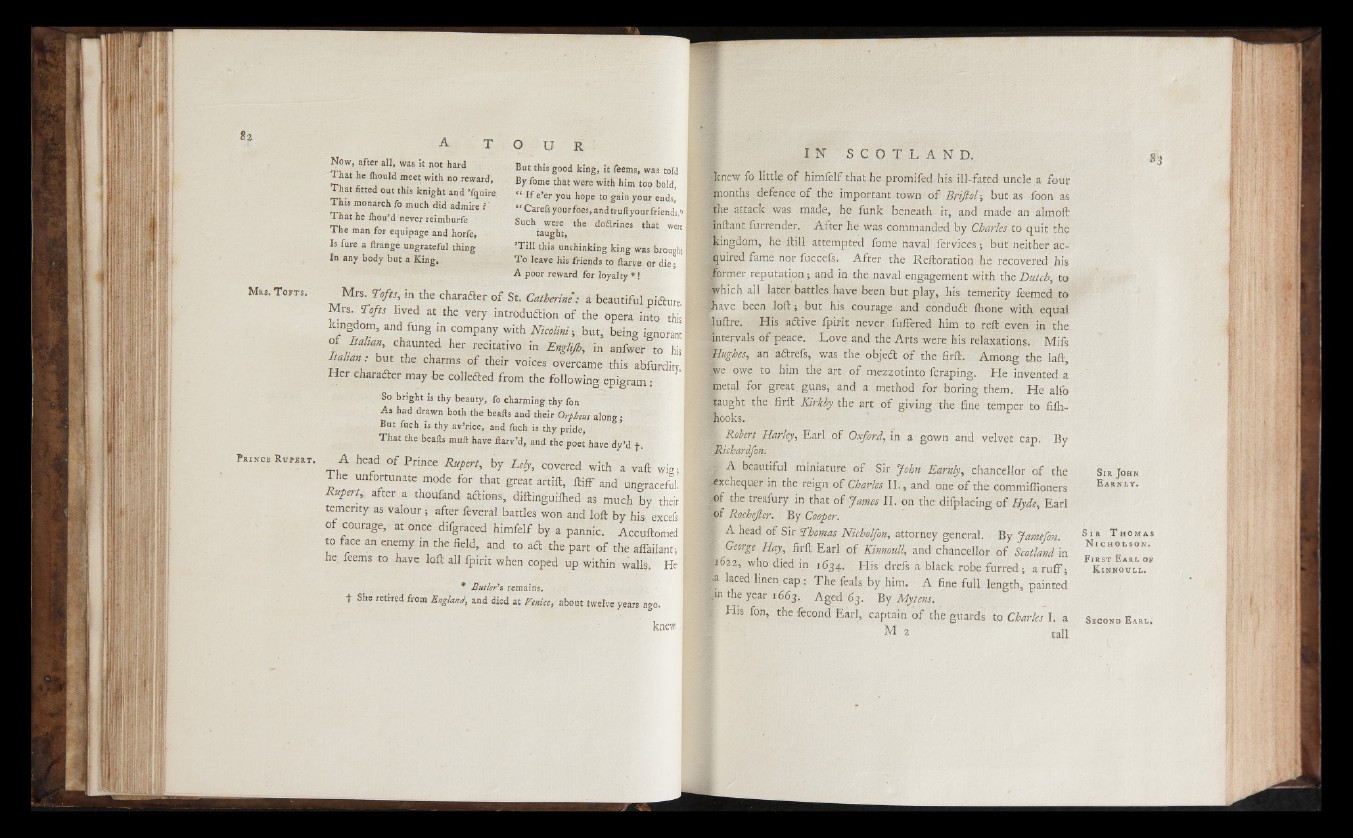
M rs, T o f t s .
P r in c e R u p e r t ,
t o u r
Now, after all, was it not hard
T h a t he ihould meet with no reward,
T h a t fitted out this knight and ’fquire,
T h is monarch fo much did admire i '
T h a t he ihou’d never reimburfe
T h e man for equipage and horfe,
Is fure a flrange ungrateful thing
In any body but a K in g ,
But this good king, it feems, was told
By fome that were with him too bold,
“ I f e’er you hope to gain your ends,
g Carefsyourfoes,andtruftyourfriends.’‘
Such were the dodlrines that wexe I
taught,
T i l l this unthinking k in g was brought I
T o leave his friends to ilarve or die^ I
A poor reward for loyalty * !
Mre. Tofts, in the charader of St. Catherine: a beautiful pidure. I
Mrs. Tofts lived at the very introdudion of the opera into this
kingdom, and fung in company with Nicolmi¡j but, being ignorant
ot Italian, chaunted her recitativo in Englijh, in anfwer to his
Italian: but the charms of their voices overcame this abfurdity.
Her character may be colleded from the following epigram :
So bright is thy beauty, fo charming thy fon
A , had drawn both the beads and their Orpheus along ;
But fuch is thy av’riee, and fuch is thy pride,
T h a t the beads mud have darv’d, and the poet have d y ’d f .
A head of Prince Rupert, by Lely, covered with a vaft wH; I
The unfortunate mode for that great artift, ftiff and ungraceful. I
Rupert, after a thoufand adions, diftinguiihed as much by their I
temerity as valour; after feveral battles won and loft by his excefs I
of courage, at once difgraced himfelf by a pannic. Accuftomed I
to face an. enemy in the field, and to aft the part of the affailant; I
he. feems to have loft all fpirit when coped up within walls. He I
Butler's remains,
+ She retired from England, and died at Venice, about twelve years ago.
knew
■knew fo little of himlelf that he promifed his ill-fated uncle a four
months defence of the important town of Briftol-, but as foon as
She attack was made, he funk beneath it, and made an altnoft
inftant furrender. After he was commanded by Charles to quit the
kingdom, he ftill attempted fome naval fervices; but neither acquired
fame nor fuccefs. After the Reftoration he recovered his
Bbrmer reputation; and in the naval engagement with the Dutch, to
-which all later battles have been but play, his temerity feemed to
fhave been loft; but his courage and conduit fhone with equal
iuftre. His adive fpirit never fuffered him to reft even in the
intervals of peace. Love and the Arts were his relaxations. Mifs
Hughes, an adrefs, was the objed of the firft. Among the laft,
.we owe to him the art of mezzotinto fcraping. He invented a
metal for great guns, and a method for boring them. He alfo
taught the firft Kirkby the art of giving the fine temper to filh-
hooks.;
fc Robert Harley, Earl of Oxford, in a gown and velvet cap. By
Jiichardfon. 1 ^ freautiful miniature of Sir John Earnly, chancellor of the
/exchequer in the reign of Charles II., and one of the commifiioners
. of the treafury in that of James II. on the difplacing of Hyde, Earl
'-.of Rochefter. By Cooper.
I A head of Sir Thomas Nicholfon, attorney general. By Jamefon.
i George Hay, firft Earl of Kinnoull, and chancellor of Scotland in
:i622, who died in 1634. His- drefs a black robe furred; a ruff;
§? laced llnen caP : The feals by him. A fine full length, painted
|m the year 1663. Aged 63. By My tens.
I His fon, the fecond Earl, captain of the guards to Charles I. a
M 2 tan
S ir John
E a r n l y .
S i r T h o m a s
N i c h o l s o n .
F i r s t E a rl of
K i n n o u l l .
S e co nd E a r l »